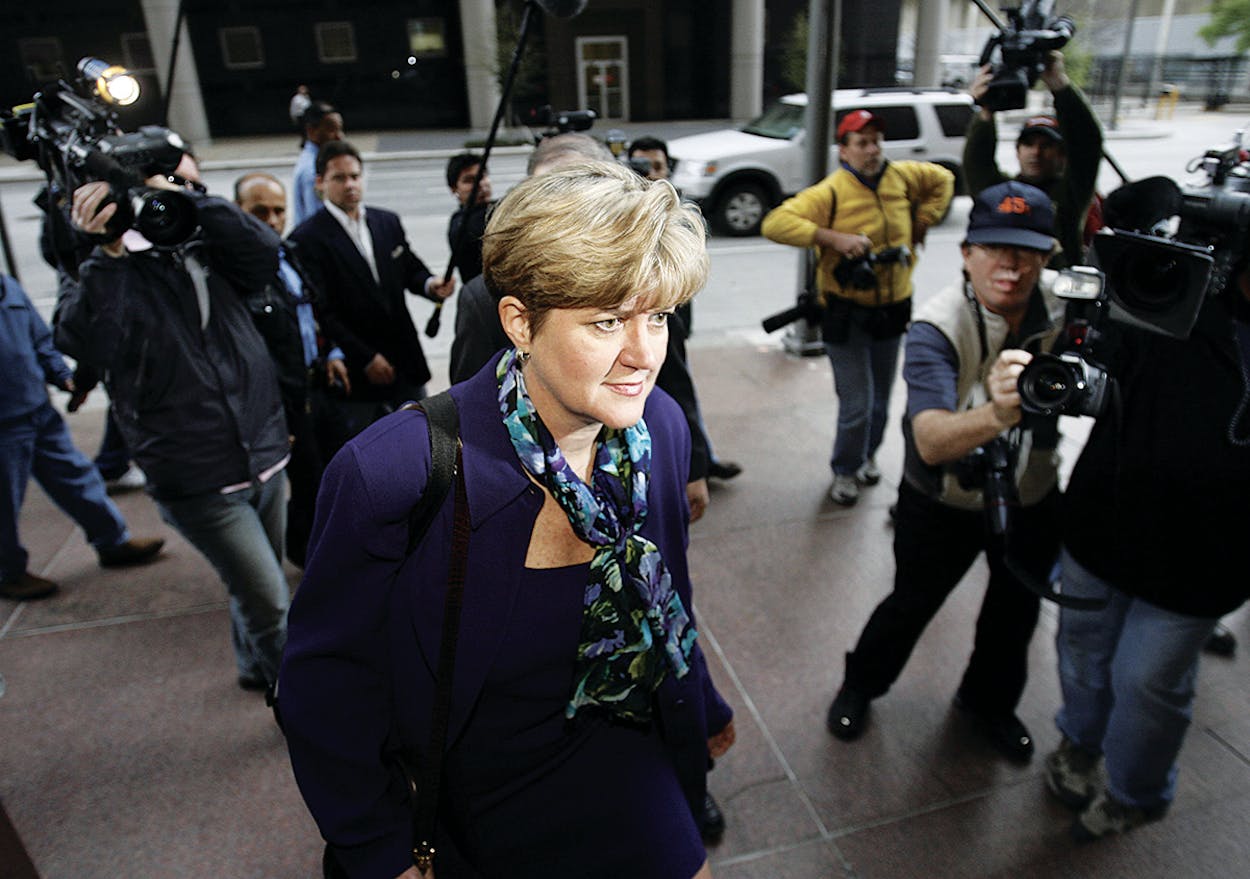A funny thing happened on my way to meet Sherron Watkins, the famous Enron whistle-blower. As I was making my way to our lunch table at a popular Museum District canteen, I ran into another Enron ex, who beat a hasty retreat when I told her whom I was meeting. The notorious energy company’s collapse may have happened fifteen years ago this month, but not everyone in Houston would agree that, as Watkins put it upon arrival, “People are over it. It was so long ago.” Actually, not even Watkins agrees with that sentiment. “I’m not sure anybody is over it,” she said, upon further reflection. “They just do that Houston thing of forgetting about it on purpose.”
To those who need a refresher, Enron was the Houston-based Wall Street darling whose downfall—the stock price went from a high of $90 a share in mid-2000 to less than $1 in November 2001—signaled a new low in corporate malfeasance and presaged the failure of companies like Lehman Brothers seven years later. Watkins, then a mere VP at Enron, was one of the few people to warn CEO Kenneth Lay of the company’s impending doom after his predecessor, Jeffrey Skilling, resigned. “I am incredibly nervous that we will implode in a wave of accounting scandals,” she wrote Lay in August 2001. That, of course, is exactly what happened over the next four months.
Today, Watkins looks much as she did back then. Her thick blond hair is still cut by the same hairdresser in a bouncy bob, her blue eyes still dance with a certain appreciation of human frailty, and she’s still a snappy dresser. (When we co-wrote a book about Enron thirteen years ago, I was always impressed that her mind and her outfits were both so well organized.)
One thing Watkins understood much better than I did back in 2001 was that she would never be able to return to the corporate world, particularly after she testified against her own company before House and Senate subcommittees. Executives might like to make a big show of fostering a corporate culture of accountability, but virtually no one will hire a person who has followed that ethos to its logical conclusion.
Instead, Watkins has refashioned herself as a speaker on faith as well as ethics in the workplace. Once a “check-the-box Christian,” she is now active in the Transformational Prayer Ministry and the InnerChange Freedom Initiative at the Carol Vance Unit, in Richmond, helping prisoners rebuild their lives. When we talked, she was on her way to Dallas to speak at the Faith@Work Summit, “sort of a TED Talk for the Christian world,” she explained. Of course, this work isn’t as lucrative as a corporate job. “My contemporaries are executives who are pulling down millions a year,” she told me, not at all wistful.
Watkins isn’t exactly a pariah in Houston. She has returned to normal life, focusing on her daughter, who was two when the scandal broke and is headed to college next year. She still sees some friends from the old days, and even goes to the occasional Enron reunion. At a recent Arthur Andersen alumni party—she worked at the accounting giant before it was brought down by its connection to Enron—she was surprised to notice that some of her former colleagues were avoiding her. “It boggles my mind that someone still thinks I’m responsible for bringing that company down,” she said.
There is, though, an upside to having that sort of reputation. Thanks largely to a never-ending supply of business scandals, Watkins speaks often at universities, where Enron has become a famous case study of poor leadership and corporate cultures that still reward greed above all. “The universities are trying to address it, but they’re fighting a losing battle,” she said.
Somewhat more lucrative than the university appearances—or her work with the nonprofit Government Accountability Project, which supports the efforts of National Security Agency whistle-blower Edward Snowden—are frequent speaking gigs that have taken her around the world. She often shares a dais with people whose career paths mirror hers, like her friends Cynthia Cooper, who exposed the largest fraud in accounting history, at WorldCom in 2002, and UT-Dallas professor Richard Bowen III, who exposed mortgage fraud while at Citigroup.
“These whistle-blowers,” she said, “we stick together.”









